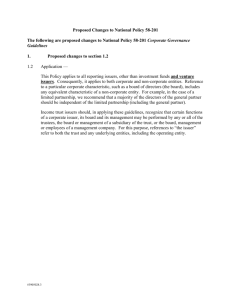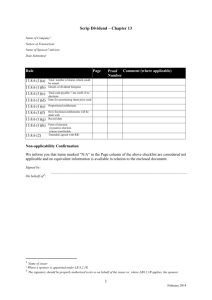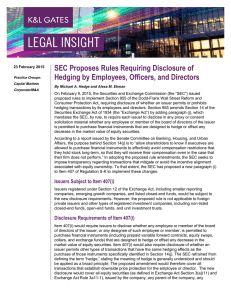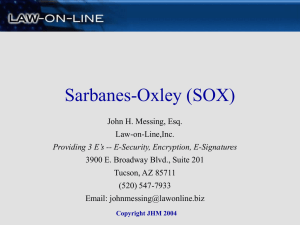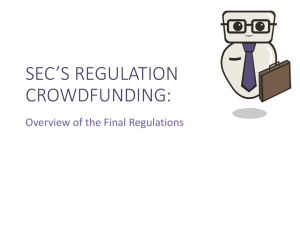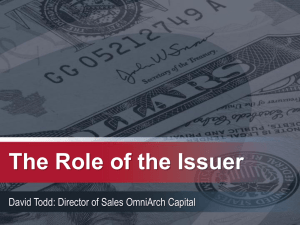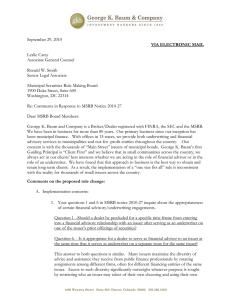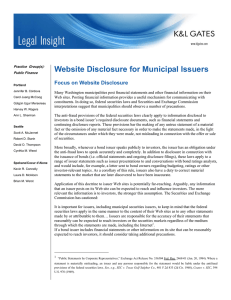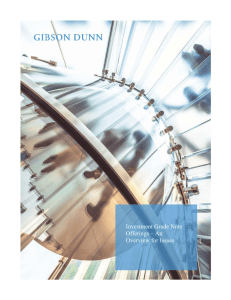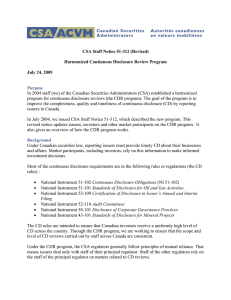“Going Private” Transactions
advertisement
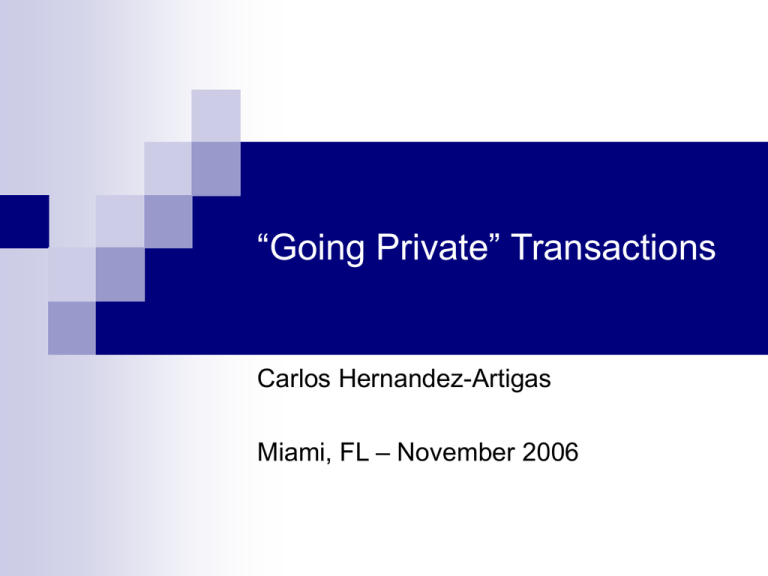
“Going Private” Transactions Carlos Hernandez-Artigas Miami, FL – November 2006 “Now That You Are Public” During a short period in the 90s, Latin American companies found a window of opportunity to list their securities in the U.S., mostly on the NYSE. The following companies, which represent almost 66% of all Latin American companies listed on the NYSE, were listed during the 90s: 1991 1992 1993 1994 1995 1996 1997 1998 1999 Vitro Ara Cruz YPF Bancolombia Quilmes Nortel Inversora Brasil Telecom Cervecerias Unidas Telmex Bladex BBVA Banco Frances Transportadora Gas del Sur Credicorp Willbros Group Unibanco Embratel Gerdau Minas Buenaventura Amber Telebras Ultra Companhia Brasileira de Distribuicao Braskem Cemex Grupo TMM Madeco Enersis Cocal-Cola FEMSA Casa Saba Televisa Radio Centro Telefonica de Argentina IRSA Metrogas CANTV CCM Telecom Argentina COPEL Embotelladora Andina CSN Endesa Concha y Toro BBVA Provida Uniabanco Santander Chile D&S LAN Quinenco SQM Bachoco Telenorte Telebras Telecom de Sao Paulo Telemig TIM Vivo FEMSA Gruma Early Years as a Public Company “Honeymoon” Period for Emerging Markets ADR Programs Became Popular Dual Classes of Stock Liquidity Privileges of Foreign Private Issuers vs. Domestic Issuers Replaced and Forgotten Bursting of Tech Bubble Brought Markets Back to Reality Focus on “Healthy” and “Less Riskier” Assets in the Domestic Market Emerging Market Stocks Drifted Regulation FD Regulation FD Requires that when an issuer intentionally discloses material information to certain persons, it do so publicly and not selectively. The company may make the required disclosure by filing the information with the SEC, or by another method intended to reach the public on a broad, nonexclusionary basis, such as a press release. When selective disclosure of material information is made unintentionally, the company must publicly disclose the information promptly thereafter. How to comply? Foreign Issuer vs. Domestic Issuers Security Issues Affecting Latin Issuers and their Employees Compromising Personal Security Disclosure of Salary Information The Board of Directors Training Foreign Directors to Think Like U.S. Directors Explanation of Duties of Directors Under U.S. Law Director Liability D&O Insurance Source: 2002 Tillinghast-Towers Perrin / IRMI.com Sarbanes-Oxley Corporate governance reforms such as: Enhanced role for audit committees; CEO/CFO certifications; Disgorgement of CEO/CFO bonuses and trading profits; and New SEC powers to bar "unfit" officers and directors. New auditor independence restrictions and attorney professional standards. Enhanced reporting requirements. Annual Costs of SOX Compliance Company Size By Annual Revenues (in Dollars) Annual Compliance Costs (in Dollars) Company Hours Expended on Compliance 24 to 99 million 740,000 3,080 100 to 499 million 780,000 5,100 500 to 999 million 1,000,000 6,900 Source: “The Impact of Sarbanes-Oxley on MidCap Issuers,” Marc Mergenstern & Peter Nealis, 2004 / www.sec.gov. What To Do? Deregistration Going Private Deregistration A foreign private issuer may deregister its class of securities by certifying that: The class of securities is held of record by less than 300 persons resident in the U.S.; or The class of securities is held of record by less than 500 persons resident in the U.S. (where the total assets of the issuer have not exceeded a certain amount). Effects of deregistration Upon filing a certification of Form 15, the issuer’s duty to file any reports required under Section 13(a) will be suspended immediately. Issuer is no longer subject to the Sarbanes-Oxley Act and SEC disclosure rules. Issuer is no longer eligible to trade on the OTC Bulletin Board. Going Private Objective of a Going Private Transaction: To pay shareholders a fair price for stock that has limited liquidity. To redirect business purpose to focus on long-term goals. To retrieve a company from an arena where it is overlooked and undervalued. Benefits to the Issuer Reduce liability for officers & directors Diminish risk of shareholder litigation Simplify governance Save on compliance costs, including SOX and D&O coverage Privacy – less disclosure Costs to the Issuer Costs of Liquidity Financing Alternatives Alternative Exchanges Carlos Hernandez-Artigas Managing Partner of Forrestal Capital, an investment banking and investment advisory firm located in Miami, Florida, with vast experience in mergers and acquisitions, corporate finance, private equity and asset management services. Formed in 2003, the firm provides services to high net worth individuals in the Latin American region. Mr. Hernandez-Artigas sits on the board of directors of a number of companies in Colombia and Argentina. His area of expertise is general corporate law and mergers and acquisitions. Prior Experience: From 1993 through 2003, he served as General Counsel and Secretary of the Board of Directors of Panamerican Beverages, Inc. (“PANAMCO”), the largest Coca-Cola Bottler outside the U.S. PANAMCO was a Panamanian company registered with the Comision Nacional de Valores de Panama (“CNV”) and listed in the New York Stock Exchange (“NYSE”) until it was sold to Coca-Cola FEMSA (“KOF”) in 2003 for $2.6 billion in cash. Prior to PANAMCO, he was a foreign associate at Fried, Frank Harris, Schriver and Jacobson in New York. He also practiced law in Mexico City and Ciudad Juarez, Mexico. Education: Universidad Panamericana, School of Law, Mexico City, Mexico in 1987; Master of Comparative Jurisprudence from the University of Texas at Austin, School of Law (1988); Master in Business Administration from Instituto Panamericano de Alta Direccion de Empresa (“IPADE”) in Mexico City (1996).
